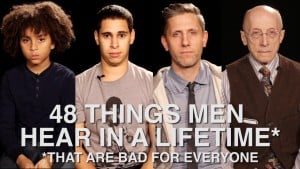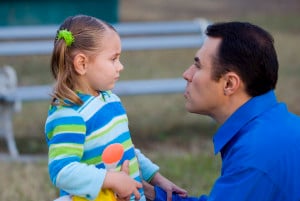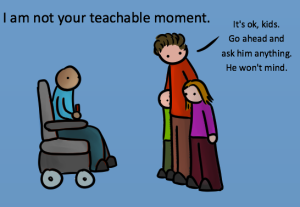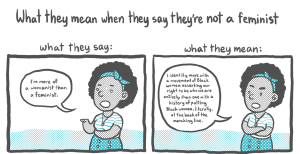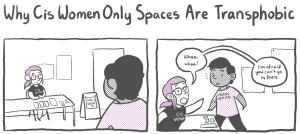
A person wearing hijab leans against a brick wall.
It’s problematic when people expect someone with any marginalized identit(ies) to educate them on what it means to experience oppression.
It’s not someone’s responsibility to be an on-demand resource or be forced to speak on behalf of “their” people.
Yet, what kind of obligations, if any, do we hold to people who date and/or are in an intimate partnership with?
With my partner, many of our conversations are bound up in talking about racism and sexism, from catching up at the end of a day, talking about a show we’re both watching, or discussing current events.
Two years ago, I wrote about how to talk about race with my partner, and I have to admit that I return to that article sometimes hoping that my past-writing-self had all the answers. As a queer woman of color, talking about racism and sexism with my partner, who is a white man, is still difficult. Because my partner and I don’t share the same day-to-day lived experiences, navigating different places of learning and also different lived experiences in a partnership can feel frustrating.
When it comes to issues around identity – like race, gender, and sexual orientation – if my partner and I disagree about something, I’m often adamant about being “right.” My desire to be “right” is tied to other desires that range from having political stakes to wanting my experiences and feelings to be understood.
In those moments, I feel compelled towards educating my partner so that we’re on the same page or he’s asking for more information to better understand.
But sharing a story about a microaggression or everyday instance of racism shouldn’t always demand a side of critical race theory.
We might feel the need to educate someone we’re dating to feel loved, supported, and understood.
It’s not always so much about educating one’s partner, but on how to communicate ways that person can be more affirming even if they don’t intellectually or experientially understand something. It’s also about being committed to growing and learning together. Often, we don’t have all the answers – and we shouldn’t be expected to.
Below are some common scenarios that show up when talking about race and how to navigate a space of mutual understanding and support.
1. You Share an Experience of Racism and Your Partner Doesn’t Immediately Empathize
Everyday racism and sexism – like being interrupted by men at meetings; having a man share the same thing I said, but louder; or being called the name of other Asian women – happens all the time. And of course, my partner is one of the first people I want to tell.
Sure, all of these moments could be complete accidents – or they could be moments where implicit racism and sexism show up.
Mentioning specific identities of race and gender are important to me in retelling these experiences, as they tie into a dynamic of racism and sexism playing out. However, my partner will sometimes say, “Well, maybe they didn’t mean it” or “You’re looking too much into it.” Sometimes he’ll wonder why I’m so frustrated.
This might be true – the other person wasn’t maliciously intending to do harm. However, that doesn’t change the reality that my feelings are hurt and that I’m expressing those hurt feelings to my partner.
When we bring in dimensions of race or gender to these stories, it’s like suddenly pinning the reason on racism or sexism makes us seem “unreasonable” or “playing the race card.” This shouldn’t be the case.
But if I were just to share a story about how someone cut in front of me in line or cut me off while driving, there might be no reason to explain the specifics of why I’m frustrated. Nor does my partner ask about that person’s intentions. Often, he’s already on my side because he can immediately draw on his own experiences to find why that’s frustrating.
While it’s definitely helpful to lay out the connection between my individual experience with a larger history – for example, sharing with my partner about how people confusing me for another Asian woman is tied to the racist assumption that “all Asians look alike” – ultimately, in the moment, what I want to hear is “that sucks.”
We look to our partners to believe in us and affirm our experiences rather than making us doubt our observations as real.
My partner can support me over taking the side of someone they don’t know. If they’re trying to find the good intentions in everyone else, they should be able to believe you when you say something made you feel upset or hurt.
2. Your Partner Wants a ‘Rational’ Explanation of Oppression
What often happens when my partner wants an explanation of oppression is that I just splutter back all of my feelings. For me, this isn’t just about having a conversation – I have personal stakes in the outcome of the conversation.
In some of our conversations, my partner has suggested that if I were “less emotional,” then maybe we could get to a place of discussion.
But rationality is often evoked as a silencing tactic and has made me feel that he was detached from my experiences. My emotions – my anger and frustration over issues of racism – are rational.
Because oppression affects people emotionally and psychologically, these conversations do get emotional and these feelings are valid, especially when political stakes are involved.
Emotions don’t make me any less competent or knowledgable in my perspectives.
When it comes to radical politics and commitment to justice, as Alex Quan-Pham writes, rationalism is irrational. Rationality is subjective to experience – and throughout history, some of the most violent, harmful systems have been built under the guise of rationality.
Oppression isn’t rational, at least not to me, so how could I ever explain it in rational terms?
When partners think they need to understand the history, the theory, and the vocabulary to be able to understand exactly where we’re coming from or to “weigh both sides of the issue” – what they really need to trust is our lived experience.
This isn’t to say that my perspective is the last and final word, but more that we need to open ourselves to what constitutes proof, facts, evidence, and reason.
In our partnership, beyond the ability to have a “rational” conversation, my hope is for my partner to grow with me in seeing how we both have a collective stake in all social justice issues.
We’re both privileged in many ways, and it should be a shared journey in working to unlearn our own assumptions from our limited experiences.
3. Your Partner Uses Problematic Language
We all make mistakes. In this case, they might not realize that a particular word or phrase is harmful or they may have just made an unintentional slip.
For people we love and for people that we’re around all of the time, we have stronger stakes in bringing up that what’s being said is problematic and why.
Even as these conversations come from a space of love, nurturing, and accountability, “calling in“ can be difficult and also requires emotional labor. It’s hard to offer compassion when we’re hurt – and even harder when calling in can sometimes be tied to the above problem of “rational” explanation.
Plus, sometimes these conversations are recurring.
While decentering white feelings in conversations of race is important, it’s complicated in a partnership. It’s hard to say, “Well, my feelings matter, but yours don’t.”
In this moment, what do you want from your partner? To own up, to apologize, to stop, to learn, and/or all of the above? What are your stakes in their accountability and in them changing their behavior? And what is their resistance to doing any of those things?
It might be resistance to being perceived as a “bad person” for making a mistake or resistance to be told they can’t do or say something.
If this language affects you personally, you should be able to let them know that for you that it’s hurtful to you. If they want to know more reasons or push back, refer them to other sources. You can also explain why, but you shouldn’t be required to educate someone on why they’re hurting someone they care about.
4. You Want to Be Able to Process Current Events with Your Partner
One of the ways my partner shows love is being able and willing to talk about race honestly and engage with my identities and experiences.
This includes being able to talk about important issues and events, particularly as what’s going on politically impacts me so personally. While we’re both politically aligned and share similar values, there’s still a lot around racial justice to process and unpack.
Sometimes that can be tricky if we’re coming from two different places of understanding and both needing to explain contextual background on our own thoughts.
Like talking about anti-Black racism in the Asian American community during protests after Peter Liang’s indictment for the murder of Akai Gurley – it was difficult to talk about why protests supporting Liang or Liang’s final verdict of community service were so troubling.
I’ve reflected a lot on what I want out of my particular partnership – it’s important to me that my partner is open to discussions of racial justice and that our time together can be a space to talk about the exciting, frustrating, heartbreaking issues and events that are ongoing.
However, I’m also finding other spaces of intimacy to have deep conversations about race. I have challenging, critical, and deep conversations with other women of color across multiple perspectives – and that’s fulfilling for me.
While we all want different things out of our partnerships, for me personally, I’ve found that my partner can’t be my only space for processing. What’s ultimately important for me in my partnership is that it’s a space that I feel supported and valued.
I’ve appreciated that my partner reads my writing to better understand where I’m coming from or he’ll take the time to read similar articles that I’m reading – I do the same so that we’re creating a supportive processing space together.
***
No matter what, a partner shouldn’t rely on just you to always play the role of a social justice educator. You’re not on call to unpack systemic oppression for another person.
You shouldn’t have to educate your partner on issues of social justice all the time, especially as they pertain to your own lived experience. Giving love and support shouldn’t require “evidence” on why someone needs it.
When it comes to race, dating, and intimacy, I’m learning that it’s less about education and more about openness when it comes to listening and believing. Social justice is a collective process – and that should also apply to dating and partnerships.
It’s not one person’s job to educate another, but more a shared responsibility to grow together.
[do_widget id=’text-101′]
Rachel Kuo is a Contributing Writer for Everyday Feminism and a scholar and educator based in New York City. Her professional background is in designing curriculum and also communications strategy for social justice education initiatives. You can follow her on Twitter @rachelkuo.
Search our 3000+ articles!
Read our articles about:
Our online racial justice training
Used by hundreds of universities, non-profits, and businesses.
Click to learn more







